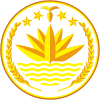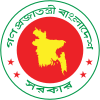This article may be too long to read and navigate comfortably. (May 2023) |
Politics of Bangladesh | |
|---|---|
 · ·  | |
| Polity type | Unitary parliamentary republic |
| Constitution | Constitution of Bangladesh |
| Legislative branch | |
| Name | Jatiya Sangsad |
| Type | Unicameral |
| Meeting place | Jatiya Sangsad Bhaban |
| Presiding officer | vacant, Speaker |
| Executive branch | |
| Head of state | |
| Title | President |
| Currently | Mohammed Shahabuddin |
| Appointer | Parliament |
| Head of government | |
| Title | Chief Adviser |
| Currently | Muhammad Yunus |
| Appointer | President |
| Cabinet | |
| Name | Cabinet of Bangladesh |
| Current cabinet | Yunus cabinet |
| Leader | Muhammad Yunus |
| Appointer | President |
| Headquarters | Bangladesh Secretariat |
| Ministries | 21 |
| Judicial branch | |
| Name | Judiciary of Bangladesh |
| Supreme Court | |
| Chief judge | Syed Refaat Ahmed |
| Seat | Supreme Court Building |
| This article is part of a series on the |
| Politics of Bangladesh |
|---|
 |
|
|
|
|
Politics of Bangladesh takes place in a framework of a parliamentary representative democratic republic, whereby the Prime Minister of Bangladesh is the head of government and of a multi-party system. Executive power is exercised by the government. Legislative power is vested in both the government and parliament. The Constitution of Bangladesh was written in 1972 and has undergone seventeen amendments.[1]
The current parliamentary system was adopted in 1991 and is based on the Westminster system. Between 1975 and 1990, the nation experienced military rule. A caretaker government was first introduced in 1990, after the resignation of military dictator Lieutenant General Hussain Muhammad Ershad (Ershad) to observe a neutral democratic election, as per demands of the two major political parties Bangladesh Nationalist Party (BNP) and Awami League (AL). Following the forced resignation of Ershad, Chief Justice Shahabuddin Ahmed was nominated as the Chief Advisor and observed the 1991 general election. A Caretaker government is headed by a Chief Adviser who enjoys the same power as the regular prime minister of the country except defense matters. The Advisors function as Ministers. After 1991, the Caretaker government has also held the elections of 1996, 2001 and 2008. Although, the first caretaker government was intended to help the transition from authoritarianism to democracy, this system was institutionalized in 1996, by the Sixth Parliament due to rising mistrust between the BNP and AL. In 2011, the then ruling party AL abolished the caretaker government system. This has been the biggest cause of dispute among many others between the BNP and the AL since then.[2]
The Economist Intelligence Unit rated Bangladesh a "hybrid regime" in 2022.[3][needs update]
| Office | Name | Party | Since |
|---|---|---|---|
| Mohammed Shahabuddin | Bangladesh Awami League | 24 April 2023 | |
| vacant | 5 August 2024 | ||
| Muhammad Yunus | Independent | 8 August 2024 | |
| vacant | 6 August 2024 | ||
| Syed Refaat Ahmed | Nonpartisan | 10 August 2024 |
- ^ "Nasim swipes at Khaleda". bdnews24.com. 18 July 2011. Archived from the original on 19 March 2012. Retrieved 4 August 2011.
- ^ "Bangladesh ends 'caretaker' polls". BBC News. 30 June 2011.
- ^ Democracy Index 2023: Age of Conflict (PDF). Economist Intelligence Unit (Report). 2024. Archived (PDF) from the original on 9 June 2024. Retrieved 22 July 2024.


